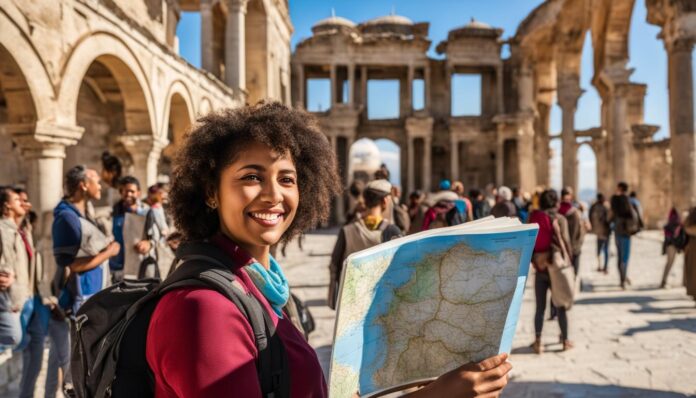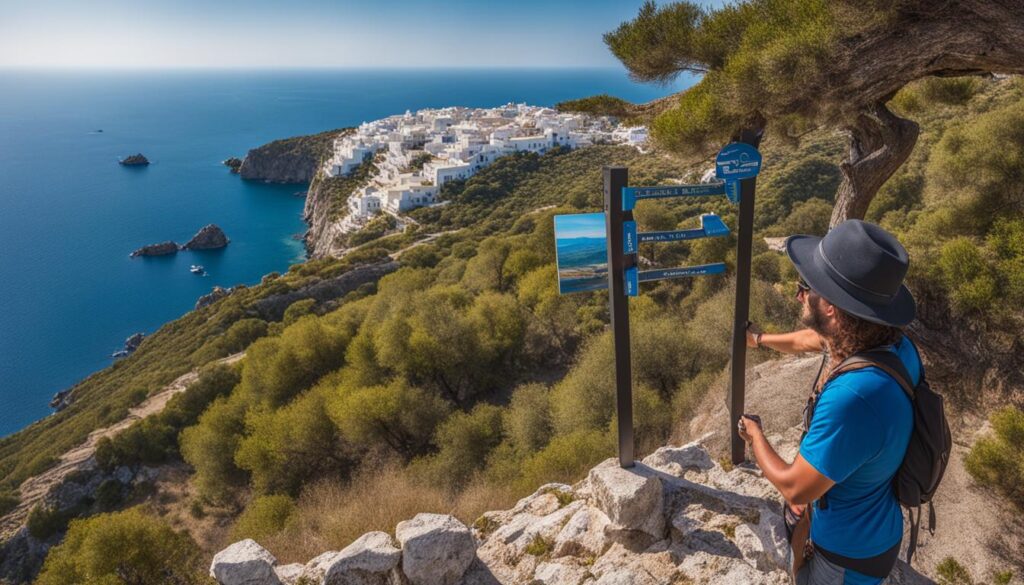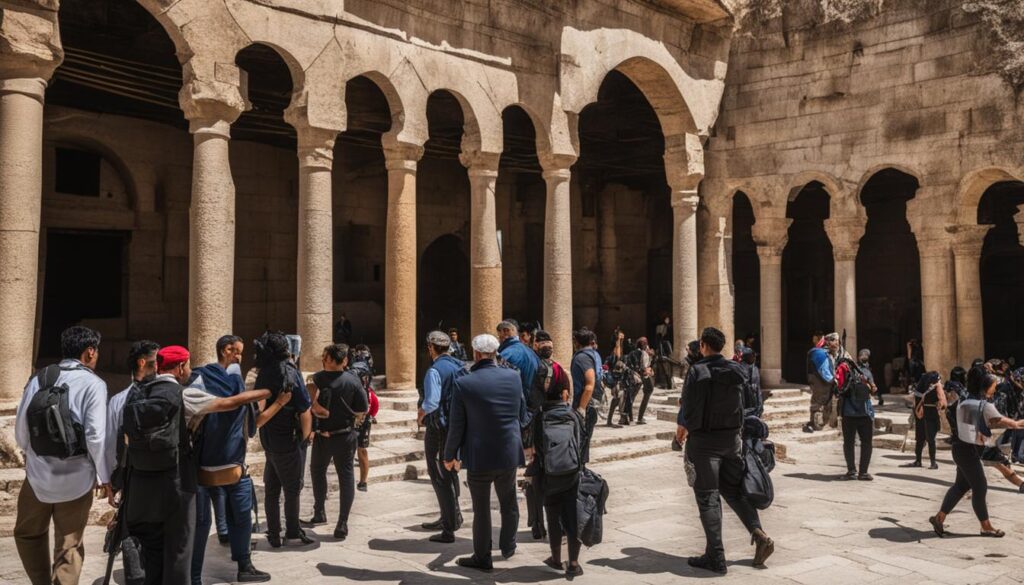If you’re considering traveling to Turkey, one of the most common questions that come to mind is, “Is Turkey safe for tourists?” It’s understandable to have concerns about travel safety in Turkey, especially with recent events in the region. However, with the right knowledge and precautions, you can have a safe and enjoyable trip to this fascinating country.
In this section, we will provide comprehensive insights and guidance to help you make an informed decision about visiting Turkey. We’ll discuss potential risks and safety concerns, current travel advisories and safety measures, essential travel tips, and popular tourist destinations in Turkey and their safety status. By following our guide, you can confidently plan your trip and enjoy all that Turkey has to offer.
Before we dive into the details, it’s important to note that millions of tourists visit Turkey annually without facing any safety issues. The Turkish government and local authorities take significant measures to ensure the safety and security of tourists.
However, it’s always wise to exercise caution and be aware of your surroundings. By taking the necessary precautions and following our travel tips, you can minimize potential risks and enjoy a safe and memorable trip to Turkey. Let’s explore travel safety in Turkey in more detail.
Current Travel Advisories and Safety Measures in Turkey
Before embarking on any international travel, it’s recommended that you check the travel advisories issued by relevant authorities. The US Department of State has issued a Travel Advisory for Turkey, currently set at Level 3 – Reconsider Travel. This is due to the potential terrorism threat and civil unrest in some parts of the country.
However, it’s important to note that the travel advisory is not a ban on travel, and millions of tourists visit Turkey every year without any issues.
To ensure your safety during your trip, it’s recommended that you take certain precautions. Avoid large crowds and demonstrations, especially political gatherings, and stay informed of the local news and developments.
When traveling within Turkey, use licensed and reputable taxis or private transportation, and avoid using unlicensed public transportation. Keep your valuables secure and avoid carrying large amounts of cash.
Tourist Safety Precautions in Turkey
The Turkish government has implemented various safety measures to ensure the safety of tourists, including increased security at airports and tourist sites. In addition, hotels and resorts have their own security measures in place, such as CCTV surveillance and security personnel.
It’s also recommended that you register your trip with the US embassy or consulate in Turkey, so they can provide assistance in case of an emergency.
COVID-19 Travel Restrictions in Turkey
Currently, Turkey has entry restrictions in place for travelers from certain countries due to the COVID-19 pandemic. All travelers are required to provide a negative COVID-19 PCR test taken within 72 hours prior to their arrival in Turkey.
Upon arrival, tourists are also subject to a health screening, including a temperature check. Face masks are mandatory in public places, including while on public transportation, and social distancing measures are also in place.
Understanding Potential Risks and Safety Concerns in Turkey
As a tourist in Turkey, it’s important to be aware of potential risks and take necessary precautions to ensure your safety. While Turkey is generally a safe country to visit, there are some areas and situations that may pose a threat.
Safe Places to Visit in Turkey
Many tourist destinations in Turkey are considered safe and attract millions of visitors every year. Some of these include:
- Istanbul: This vibrant city is famous for its historical landmarks, delicious cuisine, and breathtaking views. However, it’s important to be vigilant in crowded areas such as Taksim Square and Istiklal Street.
- Cappadocia: Known for its unique landscape of cave dwellings and hot air balloon rides, Cappadocia is generally a safe and peaceful destination.
- Antalya: With its beautiful beaches, ancient ruins, and luxurious resorts, Antalya is a popular destination for tourists seeking relaxation. However, it’s important to be cautious when venturing into the city’s less touristy areas.
- Ephesus: This ancient city is a popular destination for history buffs and archaeology enthusiasts. While it’s generally safe, it’s important to be aware of pickpocketing and theft in crowded areas.
Tips to Ensure Your Personal Safety
While Turkey is a relatively safe country, it’s important to take certain precautions to ensure your personal safety:
- Avoid political rallies and demonstrations, as they can turn violent.
- Be cautious in crowded areas such as public transportation, markets, and tourist attractions, as they can be potential targets for pickpocketing and theft.
- Keep your valuables, such as your passport and cash, in a safe place and avoid carrying large amounts of money with you.
- Stay aware of your surroundings and trust your instincts. If you feel uncomfortable in a situation, it’s best to leave.
By being mindful of potential risks and taking necessary precautions, you can have a safe and enjoyable trip to Turkey.
“While Turkey is generally a safe country to visit, there are some areas and situations that may pose a threat.”
Essential Travel Tips for a Safe Journey in Turkey
Traveling to Turkey can be an exciting and enriching experience. To ensure a safe and enjoyable journey, it’s important to keep certain travel tips in mind:
- Make sure to carry a photocopy of your passport and keep it in a safe place separate from the original document. Additionally, keep a digital copy of your passport and other important documents on your smartphone or cloud storage.
- Use reputable tour companies and licensed taxis for transportation.
- Avoid wearing flashy jewelry or carrying large amounts of cash. Use credit cards when possible.
- Be aware of your surroundings and keep an eye on your belongings, especially in crowded tourist areas.
- Learn a few basic Turkish phrases to communicate with locals and show respect for their culture.
- Respect local customs and dress modestly when visiting religious sites.
- Be cautious of scams, such as fake tour guides or counterfeit currency.
- Check weather and seasonal conditions before packing for your trip. Istanbul, for example, can have both hot summers and cold winters.
- Keep emergency contact numbers and addresses with you at all times, including the nearest embassy or consulate.
By following these travel tips, you can minimize potential risks and enjoy a smooth and safe journey in Turkey. Don’t let fear hold you back from experiencing the beauty and hospitality of this unique country.
Exploring Turkey’s Security Measures and Infrastructure
Turkey has taken significant steps to ensure the safety of tourists visiting the country. The government and local authorities have implemented a range of security measures that include:
- Increased security presence in popular tourist areas and transportation hubs
- 24/7 monitoring of public spaces and online communication channels to prevent any potential threats
- Security checks at airports and other entry points
- Strict control of firearms and other weapons
- Coordination with international agencies and neighboring countries to ensure border security and information sharing
Moreover, Turkey has invested heavily in its infrastructure to provide a safe and comfortable traveling experience for tourists. The country has a modern transportation network that includes airports, railways, and highways connecting major cities. Public transportation in urban areas is widely available and operates safely and efficiently.
When it comes to accommodation, you can find a range of options, from budget-friendly hostels to luxury hotels. The hospitality industry in Turkey is renowned for its warm and welcoming culture, and staff members often go out of their way to ensure the safety and comfort of their guests.
Turkey is also home to several medical facilities that cater to the needs of tourists. Most hotels have access to medical assistance, and there are English-speaking doctors available in major cities. However, it’s advisable to carry travel insurance that covers medical expenses and emergency evacuation.
Safe Places to Visit in Turkey
While Turkey is generally safe for tourists, it’s essential to exercise caution and be aware of potential risks, especially in popular tourist areas. Tourists are recommended to avoid areas near the Syrian border, as well as the southeastern provinces of the country where there have been security issues in the past.
Some of the safest places to visit in Turkey include:
- Istanbul – the cosmopolitan city features stunning architecture, historical landmarks, and delicious cuisine. The city is well-connected by public transportation, and there are plenty of safe neighborhoods to explore.
- Cappadocia – the region is known for its stunning natural beauty, including rock formations, fairy chimneys, and hot air balloon rides. The area is relatively safe, and there’s a significant presence of security personnel.
- Pamukkale – the UNESCO World Heritage site is famous for its thermal pools, cascading terraces, and ancient ruins. The area is safe, and there are plenty of accommodation options available.
By following tourist safety precautions in Turkey and being mindful of your surroundings, you can have a safe and enjoyable trip to this fascinating country.
Local Customs and Cultural Considerations for Tourists
As a tourist in Turkey, it’s important to be aware of the local customs and cultural considerations to have a safe and respectful experience.
One of the most significant cultural aspects in Turkey is religion. Islam is the predominant religion, and visitors should be respectful when visiting mosques or any religious sites. Dress modestly and remove shoes before entering mosques. Women should cover their heads, arms, and legs.
Another important aspect of Turkish culture is hospitality. Turks are warm and welcoming people, and it’s common for locals to invite visitors to their homes. If you’re invited, it’s considered polite to bring a gift such as desserts or flowers.
When dining in local restaurants, it’s helpful to know that Turkish cuisine often includes shared plates, and it’s common to use bread to scoop up food. Also, it’s customary to drink tea after meals, and it’s considered polite to accept the offer.
It’s essential to respect Turkish laws and regulations, including restrictions on photography in some areas and smoking bans in public places. Additionally, avoid public displays of affection, especially in conservative areas.
When interacting with locals, greet them by saying “Merhaba” (hello) or “Selam” (peace). Also, use “lutfen” (please) and “tesekkür ederim” (thank you) when making requests or expressing gratitude.
Overall, understanding and respecting Turkish customs and cultural considerations can help you have a safe and enjoyable trip to this beautiful country.
Popular Tourist Destinations in Turkey and Their Safety Status
Turkey boasts several popular tourist destinations that attract millions of visitors annually. If you’re planning a trip to Turkey, it’s important to consider the safety status of these destinations to ensure a secure and enjoyable stay.
Safe Places to Visit in Turkey
Popular tourist destinations in Turkey that are deemed safe to visit include:
| Destination | Safety Status |
|---|---|
| Istanbul | Most areas are safe for tourists, but stay alert in crowded places and beware of pickpockets. |
| Cappadocia | Considered safe for tourists with low crime rates. |
| Antalya | A safe destination for tourists with a low crime rate, but beware of traffic accidents. |
| Ephesus | One of the safest tourist destinations in Turkey with a low crime rate. |
These destinations offer a rich cultural experience, breathtaking scenery, and a variety of activities to enjoy. However, it’s important to stay aware of your surroundings and take necessary precautions to ensure your safety.
Travel Safety in Turkey
To ensure a safe trip to Turkey, consider the following travel safety tips:
- Avoid political gatherings and demonstrations.
- Stay alert in crowded areas and tourist hotspots.
- Beware of pickpockets and petty thieves.
- Use official taxis or pre-booked transportation.
- Avoid walking alone at night in remote or poorly lit areas.
- Respect local customs and avoid confrontations.
By following these tips and being aware of the safety status of popular tourist destinations in Turkey, you can have a safe and enjoyable trip.
Emergency Contacts and Resources for Tourists in Turkey
It’s important to be prepared for any unforeseen circumstances that may occur while traveling in Turkey. Here are some essential emergency contacts and resources that can assist you in case of an emergency:
Hospitals and Medical Emergencies
In case of a medical emergency, the following hospitals offer 24-hour emergency services:
| Hospital Name | Contact Number |
|---|---|
| Acıbadem Maslak Hospital | +90 212 304 44 44 |
| American Hospital Istanbul | +90 212 444 3 444 |
If you require medical assistance, you can dial 112 for an ambulance.
Police and Safety
The police emergency number in Turkey is 155. If you need immediate assistance, you can dial this number to contact the police. For non-emergency situations, you can reach the police department at 156.
Embassies and Consulates
If you require assistance from your embassy or consulate while in Turkey, the following contact details may be helpful:
- United States: U.S. Embassy in Ankara – +90 312 455 5555
- United Kingdom: British Embassy in Ankara – +90 312 455 3344
- Canada: Canadian Embassy in Ankara – +90 312 409 2700
Tourist Assistance
The Ministry of Tourism and Culture provides a 24/7 tourist helpline to assist travelers with any questions or concerns. The helpline can be reached at +90 212 444 3 865.
Additionally, your hotel or accommodation may be able to provide you with local emergency contact information.
By being aware of the emergency contacts and resources available, you can have peace of mind and enjoy a safe journey in Turkey.
Conclusion
In conclusion, Turkey offers a unique and enriching travel experience for you as a tourist. While it’s important to be aware of potential risks and take necessary precautions, millions of travelers visit Turkey annually without facing any safety issues.
By following the travel tips we have shared in this guide and being respectful of local customs and culture, you can have a safe and memorable trip to this captivating country. Remember to pay attention to current travel advisories and take necessary safety precautions, such as avoiding areas with high crime rates and staying alert in crowded places.
Don’t forget to also consider the safe places to visit in Turkey and take advantage of the security measures and infrastructure in place to protect tourists. If you ever find yourself in an emergency situation, it’s important to have access to emergency contacts and resources, which we have provided in this guide.
Overall, Turkey is a safe and welcoming destination for tourists, with so much to offer in terms of history, culture, and natural beauty. With the right preparation and mindset, you can have an amazing travel experience in Turkey that you will cherish for years to come!

















































